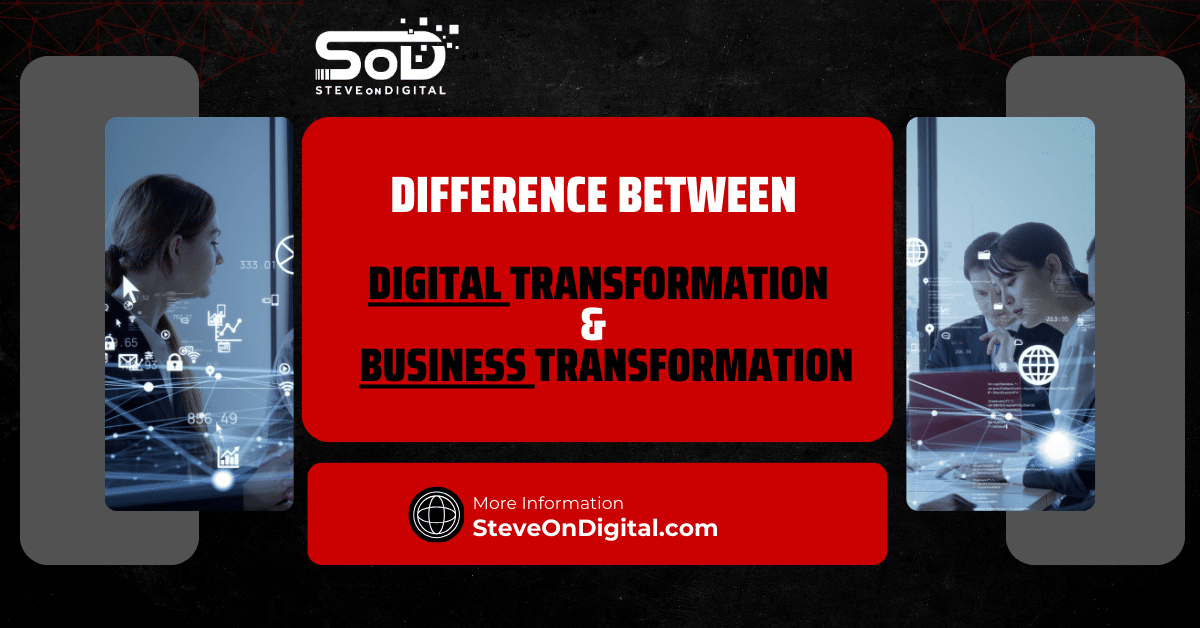As Steve Johnston, your go-to Digital Transformation Specialist with a rich background in electrical engineering, an MBA, and a master’s in Project Management, I’ve dedicated my career to demystifying the digital landscape for small and medium-sized businesses (SMBs).
Defining Cloud Computing And Its Role In Transforming The Business Landscape
Cloud computing is an innovative technology that allows businesses to access data, applications, and services over the internet rather than through physical computers and servers.
This shift to virtual resources has revolutionized how companies operate, offering unprecedented flexibility and scalability.
Cloud computing’s essence lies in its ability to provide small businesses with the tools and capabilities that were once the exclusive domain of large corporations.
The Crucial Importance Of Cloud Computing For SMBs In Today’s Digital Era
For small businesses, cloud computing is not just a technological upgrade; it’s a strategic advantage.
In today’s digital era, where agility and efficiency are paramount, cloud computing provides SMBs with the ability to swiftly adapt to market changes, scale operations, and improve customer experiences without the hefty investment in IT infrastructure.
This democratization of technology has leveled the playing field, allowing small businesses to compete more effectively against larger competitors.
The Essence Of Cloud Computing: A Business Transformation Tool
Core Concepts: Accessing Remote Servers And Cloud Services
At its core, cloud computing relies on the internet to provide businesses with access to data and applications stored on remote servers.
This model eliminates the need for costly on-site hardware and maintenance, freeing up capital and resources that can be better spent on innovation and growth.
Cloud services range from basic data storage to comprehensive computing services and sophisticated applications, all accessible via the cloud.
Comparison Of Cloud Service Models
| Cloud Service Model | Description | Best for |
| IaaS (Infrastructure as a Service) | Provides virtualized computing resources over the internet. | SMBs looking for full control over their infrastructure without the physical overhead. |
| PaaS (Platform as a Service) | Offers hardware and software tools over the internet, typically for application development. | SMBs developing or deploying applications without investing in underlying platforms. |
| SaaS (Software as a Service) | Delivers software applications over the internet, on a subscription basis. | SMBs seeking accessible, scalable applications without managing the underlying infrastructure. |
Transformative Business Operations: From Enhanced Data Storage To Sophisticated Applications
Cloud computing has been a game-changer for business operations, offering more than just storage solutions.
Cloud services now encompass advanced computing capabilities, including analytics, artificial intelligence, and machine learning, which empower small businesses to make data-driven decisions and innovate at a rapid pace.
For example, as the owner and author of SteveOnDigital, I’ve leveraged cloud-based tools to optimize our content delivery, ensuring that our valuable insights and practical advice reach our target audience efficiently and effectively.
Anytime, Anywhere Data Accessibility: The Power Of The Cloud
One of the most significant advantages of cloud computing is the ability to access data from anywhere, at any time, as long as there’s an internet connection.
This flexibility is crucial for small businesses, especially in today’s dynamic market environment.
Whether I’m consulting with clients, sharing expertise on Steve’s YouTube channel, or contributing to local economic development, the cloud ensures that all the necessary information and tools are readily available, fostering collaboration and productivity regardless of physical location.
Advantages Of Cloud Computing For SMBs: Transformative Benefits
As someone deeply entrenched in the world of digital transformation, I’ve seen firsthand the seismic shifts cloud computing has introduced to small businesses.
Let’s dive into how cloud computing reshapes the landscape for SMBs, leveraging my personal journey and insights from SteveOnDigital.
Cost Management And Efficiency
Eliminating Upfront Hardware Costs With Pay-As-You-Go Models
One of the most significant benefits I’ve observed is the cost efficiency cloud computing brings.
Traditional IT infrastructures involve hefty upfront investments in hardware and software.
In contrast, cloud services operate on a pay-as-you-go basis.
This model allows small businesses to avoid large initial expenses, paying only for the computing resources they use.
This shift is not just about saving money; it’s about reallocating resources towards growth and innovation.
Resource Scalability Based On Business Needs
Scalability is another game-changer. Cloud computing allows small businesses to scale their IT resources up or down based on current needs.
During a product launch or seasonal peak, for instance, a business can easily ramp up its capacity.
Likewise, it can reduce resources during slower periods.
This flexibility ensures that small businesses are not paying for idle resources, making operations more efficient.
Embracing The Cloud: Unleashing Growth For Small Businesses
In today’s rapidly evolving digital marketplace, small businesses stand to gain significantly from the strategic implementation of cloud computing.
Cloud services offer a plethora of benefits tailored to enhance operational efficiency, from cost-effective data storage solutions to sophisticated cloud-based tools that facilitate seamless business operations.
For small businesses, leveraging cloud computing means more than just accessing data storage or cloud backup services; it’s about unlocking the full potential of cloud services to drive innovation and competitive advantage.
With a reliable internet connection and cloud service providers, businesses can enjoy enhanced cloud security, streamlined computing services, and flexible access to data—anytime, anywhere.
Moreover, the adaptability of cloud computing for small businesses ensures that as your business grows, your IT infrastructure can scale accordingly without the need for significant upfront investment in local servers or data centers.

By choosing the right cloud provider and engaging in a thoughtful cloud implementation process, small business owners can safeguard their customer data against data breaches while benefiting from cost-effective, pay-as-you-go pricing models.
Ultimately, the strategic adoption of cloud computing not only mitigates traditional IT security concerns but also positions small businesses for sustainable growth and success in the digital age.
Operational Flexibility And Scalability
Adapting To Business Growth With Cloud Solutions
The cloud is inherently designed to support business growth.
As small businesses expand, cloud solutions can be seamlessly scaled to accommodate new demands, whether it’s adding more storage, increasing bandwidth, or integrating new services.
This adaptability has been crucial for my operations at SteveOnDigital, enabling us to smoothly transition through different phases of growth without the limitations of physical infrastructure.
Streamlining IT Management: Outsourcing Maintenance And Updates
Cloud computing also offloads the burden of IT maintenance and updates.
Cloud providers are responsible for managing the infrastructure, performing regular software updates, and ensuring system reliability.
This outsourcing of IT management allows small businesses to focus more on their core operations and less on technical issues, a benefit I’ve personally experienced in streamlining our digital services.
Enhanced Collaboration And Productivity
Facilitating Real-Time Document Sharing And Communication
The collaborative power of the cloud has transformed how teams work.
Cloud-based tools enable real-time document sharing and communication, allowing team members to collaborate more effectively, regardless of their physical location.
This feature has been instrumental in our ability to rapidly iterate on projects and maintain a high level of productivity, even with a dispersed team.
Promoting Efficient Remote Teamwork
The rise of remote work has made the cloud’s ability to support efficient teamwork even more valuable.
Cloud services ensure that all team members have access to the necessary data and applications, fostering a cohesive work environment.
This access has been vital for maintaining operational continuity and team cohesion at SteveOnDigital, especially in the face of the recent global shifts towards remote work.
Reliability And Security Assurance
Security Measures And Peace Of Mind With Cloud Backup Services
Data security and backup are paramount for any business.
Cloud computing offers robust security measures, including encrypted data storage, secure access controls, and comprehensive backup solutions.
These features provide peace of mind, knowing that critical business data is protected against loss and unauthorized access.
The Role Of Cloud Providers In Ensuring Data Protection
Cloud providers play a crucial role in safeguarding data.
They implement state-of-the-art security protocols and conduct regular penetration testing to defend against potential threats.
Relying on their expertise offers an additional layer of security, ensuring that small businesses can operate with confidence in the integrity of their data.
Key Advantages And Challenges Of Cloud Computing For SMBs
| Advantages | Challenges |
| Cost Efficiency | Security Concerns |
| Scalability and Flexibility | Limited Control Over Data |
| Enhanced Collaboration | Dependency on Internet Connectivity |
| Improved Business Continuity | Potential Hidden Costs |
Navigating The Challenges: Potential Cloud Computing Concerns For SMBs
Security And Data Protection Concerns
Addressing Anxieties About Data Security And Breaches
Despite the robust security measures in place, concerns about data security and potential breaches persist.
These anxieties are understandable, given the increasing sophistication of cyber threats.
However, cloud providers are continually updating their security practices to combat these risks, offering a level of protection often beyond what small businesses could achieve on their own.
Robust Security Measures: Encryption, Access Controls, And Backups
To mitigate these concerns, cloud services employ multiple layers of security measures, including encryption, access controls, and regular backups.
These strategies ensure that data is not only protected from unauthorized access but also recoverable in the event of data loss, providing a comprehensive security framework.
Operational Control And Internet Dependency
Limited Control Over Data And Applications In The Cloud
A trade-off of utilizing cloud services is the perceived loss of control over data and applications.
When moving to the cloud, businesses entrust their operations to third-party providers.
While this can raise concerns, choosing the right provider and establishing clear service level agreements (SLAs) can mitigate these issues, ensuring that businesses retain the necessary oversight and control.
Internet Reliance: Overcoming Connectivity Challenges
Cloud computing’s reliance on internet connectivity is another challenge. A stable internet connection is crucial for accessing cloud services.
To overcome this dependency, businesses can invest in redundant internet connections or hybrid cloud solutions that allow for offline access to critical applications, ensuring continuity of operations even in the event of connectivity issues.
The Transparency Of Costs And Control
Unveiling Potential Hidden Costs In Cloud Services
While cloud computing is often more cost-effective than traditional IT infrastructure, it’s essential to be aware of potential hidden costs.
These can include fees for data transfer, additional storage, or premium services.
Careful planning and understanding the pricing structure of cloud services can help businesses avoid unexpected expenses.
Strategies For Avoiding Vendor Lock-In And Understanding SLAs
Vendor lock-in is a concern for businesses using cloud services, as it can limit flexibility and control.
To avoid this, small businesses should seek cloud providers that offer interoperability and data portability.
Additionally, understanding and negotiating SLAs can ensure that the services meet the business’s specific needs, providing clarity on what to expect from the cloud provider.
Embarking On The Cloud Journey: Decision-Making For SMBs
In the vast digital landscape, small business owners like myself face myriad decisions on a daily basis, yet few are as pivotal as the shift to cloud computing.
Drawing from my experiences at SteveOnDigital, let’s navigate the process of adopting cloud solutions tailored to the unique needs of SMBs.
Tailoring Cloud Solutions To Business Needs
Assessing Specific Applications, Security, And Scalability Needs
The initial step in our cloud journey involves a thorough assessment of our specific needs.
This means pinpointing the applications that are crucial for our operations, evaluating our security requirements, and planning for future scalability.
For instance, cloud storage services and cloud backup solutions became indispensable for us, not just for their efficiency, but for their robust security measures that protect our precious data.
Critical Evaluation Of Cloud Providers
Researching Providers: Security, Support, Reputation, And Costs
Choosing the right cloud provider is akin to selecting a business partner; it requires meticulous research and consideration.
Key factors include the provider’s security credentials, the support they offer, their reputation within the industry, and of course, the costs involved.
My approach was to engage in comprehensive discussions with various service providers, weighing their service level agreements against our business needs to find the best match.
The Importance Of Trials And Demonstrations
I cannot stress enough the value of utilizing trials and demonstrations offered by cloud providers.
These opportunities allow you to see firsthand how a particular cloud service will fit into your business operations, ensuring that the chosen solution aligns with your business goals and operational workflows.
Ensuring Data Security And Regulatory Compliance
Selecting Providers With Strong Security And Backup Solutions
In an era where data breaches and security threats loom large, selecting cloud providers that offer robust security and backup solutions is non-negotiable.

Our selection process heavily favored providers who could demonstrate comprehensive security measures, including encryption, regular security audits, and reliable recovery services, to safeguard our customer data and business operations.
Adhering To Industry Data Protection Standards
It’s also crucial to ensure that your cloud provider adheres to industry data protection standards.
This adherence not only protects your business and customer data but also ensures that your company remains compliant with regulatory requirements, a consideration that has become increasingly important in our operations.
Implementation And Operational Success: Ensuring A Smooth Cloud Transition
The transition to cloud computing can be transformative for small businesses, yet it requires careful planning and execution to ensure success.
Strategic Implementation Planning
Structured Migration Of Data And Applications To The Cloud
A structured approach to migrating data and applications is essential for a smooth transition to the cloud.
This process involves a detailed plan that outlines which data and applications will move, in what order, and how they will be tested in the new cloud environment.
Our journey involved mapping out a phased migration that minimized operational disruptions and allowed us to maintain business continuity.
Comprehensive Employee Training
Maximizing Efficiency And Adoption With Cloud-Based Tools Training
Employee training is critical to maximizing the efficiency and adoption of cloud-based tools.
Investing in comprehensive training ensures that all team members are proficient in using the new systems and can leverage the full range of features offered by cloud services.
At SteveOnDigital, we found that hands-on training sessions and access to ongoing learning resources were key to empowering our staff and making the most of our cloud investments.
Leveraging Ongoing Support
The Benefits Of Continuous Support From Cloud Providers
The importance of ongoing support from your cloud provider cannot be overstated.
Continuous support ensures that any issues are promptly addressed and that you have access to the latest updates and security measures.
This level of support has been instrumental in our operational success, providing us with the confidence that our cloud infrastructure is always running smoothly and securely.
The Future Horizon: Cloud Computing’s Evolving Role For SMBs
In our journey at SteveOnDigital, exploring the depths of digital transformation for small and medium-sized businesses (SMBs), we’ve witnessed firsthand the evolution of cloud computing.
This technology isn’t just changing; it’s dramatically reshaping the competitive landscape for businesses willing to adapt.
Innovations And Emerging Trends In Cloud Computing
The future of cloud computing shines brightly with innovations and emerging trends that promise to further enhance business operations.
We’re looking at the proliferation of AI and machine learning integrated within cloud services, offering SMBs powerful tools to analyze data, predict trends, and automate processes like never before.
Additionally, the advent of edge computing, working in concert with cloud technologies, aims to reduce latency and improve speed, crucial for operations requiring real-time data analysis.
Future Cloud Computing Trends Impacting SMBs
| Trend | Impact on SMBs |
| AI and Machine Learning Integration | Enables smarter, data-driven decision-making and automation of routine tasks. |
| Edge Computing | Reduces latency and improves speed for real-time data processing, enhancing operational efficiency. |
| Enhanced Cloud Security Measures | Strengthens data protection, builds trust, and compliance with regulations. |
| Adoption of Multi-cloud and Hybrid Cloud Strategies | Offers flexibility, mitigates risk, and optimizes cost and performance. |
Staying Competitive With Advancements In Cloud Technologies
For SMBs, staying abreast of these advancements isn’t just beneficial—it’s essential for maintaining competitiveness.
The ability to swiftly adapt to new cloud-based tools and platforms can be the difference between leading the market or lagging behind.
At SteveOnDigital, embracing these technologies early has enabled us to provide more value to our clients, showcasing the importance of innovation in sustaining growth.
Maximizing Cloud Computing For Small Business Success
In the realm of digital transformation, cloud computing emerges as a cornerstone for small business success, offering a wide array of advantages that cater specifically to the dynamic needs of emerging enterprises.
From cost-effective cloud hosting services that eliminate the need for extensive in-house IT infrastructure to the unparalleled flexibility of cloud storage solutions, small businesses have never been in a better position to scale and adapt to market demands.

However, the journey into the cloud is not without its hurdles, including concerns over data security and the potential for internet connectivity issues.
Despite these challenges, the strategic adoption of cloud services, underscored by robust security measures and comprehensive service level agreements, can significantly mitigate risks while unlocking growth opportunities.
This balanced approach to cloud computing—leveraging its many benefits while carefully navigating its cons—enables small business owners to not only safeguard their operations against data breaches and ensure continuity in the face of internet dependency but also to thrive in a competitive digital landscape.
By selecting the right cloud provider and employing cloud-based tools judiciously, SMBs can achieve enhanced operational efficiency, foster innovation, and position themselves for long-term success.
Conclusion
As we stand at the precipice of a new era in digital business operations, the journey into cloud computing offers more than just a technological upgrade—it offers a pathway to transformation.
Making An Informed Decision On Cloud Computing Integration
The decision to integrate cloud computing into your business operations should be made with a comprehensive understanding of both its potential and its challenges.
For SMBs, this means considering not just the immediate benefits of cost savings and operational efficiency, but also the longer-term advantages of scalability, flexibility, and innovation.
Making this shift, as we have at SteveOnDigital, requires a strategic approach, ensuring that the chosen cloud solutions align perfectly with your business goals and growth plans.
The Transformative Potential Of Cloud Computing For SMB Growth And Competitiveness
Cloud computing holds transformative potential for SMBs, offering unprecedented opportunities for growth and competitiveness.
By leveraging cloud technologies, businesses can access the same powerful tools and resources as larger corporations, leveling the playing field in an increasingly digital world.
Moreover, the agility and scalability provided by the cloud enable SMBs to respond more effectively to market changes and customer needs, fostering innovation and ensuring long-term success.
In wrapping up, the journey toward cloud computing for SMBs is not without its hurdles, yet the path it paves for future growth, efficiency, and innovation is undeniable.
As someone deeply entrenched in the digital transformation landscape, I’ve seen the remarkable impact cloud computing can have on small businesses.
It’s a journey well worth embarking on, one that requires careful planning, but promises to reshape the future of your business.
At SteveOnDigital, our experience has solidified our belief in the power of cloud computing to not only support but significantly propel SMBs into a prosperous future.
Embracing this technology is a crucial step in crafting a future-proof business, ready to thrive in the digital era.




